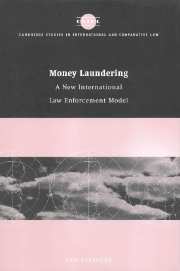Book contents
- Frontmatter
- Contents
- Preface
- Table of treaties and agreements
- List of abbreviations
- Part I New instruments in the fight against acquisitive crime: confiscation of proceeds from crime and criminalisation of money laundering
- Part II The prevention of money laundering
- Part III Jurisdiction over money laundering
- 8 Various types of jurisdictional problem in the fight against money laundering
- 9 Territorial jurisdiction in respect of money laundering offences
- 10 Extra-territorial jurisdiction in respect of money laundering offences
- Part IV International co-operation in combating money laundering
- Epilogue
- Bibliography
- Index
- CAMBRIDGE STUDIES IN INTERNATIONAL AND COMPARATIVE LAW
9 - Territorial jurisdiction in respect of money laundering offences
Published online by Cambridge University Press: 16 October 2009
- Frontmatter
- Contents
- Preface
- Table of treaties and agreements
- List of abbreviations
- Part I New instruments in the fight against acquisitive crime: confiscation of proceeds from crime and criminalisation of money laundering
- Part II The prevention of money laundering
- Part III Jurisdiction over money laundering
- 8 Various types of jurisdictional problem in the fight against money laundering
- 9 Territorial jurisdiction in respect of money laundering offences
- 10 Extra-territorial jurisdiction in respect of money laundering offences
- Part IV International co-operation in combating money laundering
- Epilogue
- Bibliography
- Index
- CAMBRIDGE STUDIES IN INTERNATIONAL AND COMPARATIVE LAW
Summary
Distinction with jurisdiction in respect of the predicate offence
This chapter deals with the question of when a state has jurisdiction over a money laundering offence. As this problem should sharply be distinguished from the question of when a state has jurisdiction to order confiscation of the proceeds from a predicate offence, attention will be paid to the latter question first. The question of whether a state has jurisdiction to order confiscation of the proceeds from a predicate offence coincides with the question of whether the state has jurisdiction over that offence, as confiscation is in principle a criminal sanction which is imposed for that offence. This will be the case when the offence takes place on the state's territory or when the state concerned can claim extra-territorial jurisdiction (e.g., on the basis of the nationality principle, when the offence is committed by one of its nationals abroad). As far as prescriptive jurisdiction is concerned, it does not in principle matter whether or not the proceeds can be found in the territory of the state that claims jurisdiction.
In most cases, the state where the proceeds from an offence are located will lack jurisdiction over the offence which took place abroad and will, as a consequence, be unable to order the confiscation of those proceeds. This has been made clear in, for example, the case law of the Swiss Supreme Court regarding (alleged) proceeds from foreign corruption offences which have been deposited in Swiss bank accounts.
- Type
- Chapter
- Information
- Money LaunderingA New International Law Enforcement Model, pp. 215 - 231Publisher: Cambridge University PressPrint publication year: 2000

